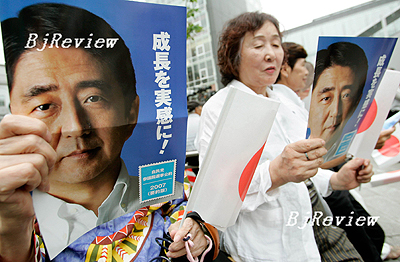
Shinzo Abe's job is on the line. During the past seven months several members of Japanese prime minister's cabinet have been embroiled in scandals, forcing Abe to hastily extinguish the ensuing political fires before crucial elections on July 29 for half the seats in Japan's upper house.
Abe's long-ruling Liberal Democratic Party (LDP) and its junior partner, the Buddhist-backed New Komeito Party, are trying to maintain their majority in the upper house against the main opposition Democratic Party of Japan (DPJ) and four other small parties. But the scandals, including the mishandling of pension records and gaffes by three cabinet ministers, could cost Abe's coalition the election.
Chinese experts have been keeping a close eye on the scandals and their political repercussions in the run-up to the elections. If Abe's coalition loses its majority in the upper house, the prime minister could be out of a job and Japan could see a new round of domestic policy inactivity.
Despite angering China and South Korea early in his administration with comments that the Japanese had little to apologize for in World War II, Abe ushered in a turning point in frosty Sino-Japanese relations when he made his first foreign visit as prime minister to China last October.
It will be tough for Abe to dig himself out of his current political quagmire, Chinese analysts said. Zheng Donghui, a researcher on Japan at the China Institute of International Studies (CIIS), told Beijing Review that the recent scandals plaguing Abe's LDP have badly damaged the conservative party's political image and endangered its hope of winning the elections.
"Once the ruling party's position is near to soundness, fights inside the party flow to the surface, and scandals burst out," Zheng said. "This is such a special phenomena in Japan, and we can even regard it as Japan's political culture. Now the Abe administration is under a test."
According to an early July poll in The Asahi Shimbun, the approval rating for Abe's cabinet fell to 28 percent-the first time it had dropped below 30 percent. Nearly half of all voters in the poll said they remained worried about their pensions because of the government's mishandling of pensions. The rate was a dangerous signal to any administrative party, the Japanese newspaper said.
The poll also showed that former LDP supporters would vote for the DPJ, Zheng said.
Abe, 52, is the youngest Japanese prime minister since World War II. When he took office on September 26, 2006, his approval rate was more than 70 percent.
Liu Jiangyong, an international relations professor at Tsinghua University, said that the Japanese have questioned Abe's leadership ability because he has chosen some of the wrong people to be government ministers and his administration has mishandled public pensions.
The Chinese also have questioned some of the Abe's government's diplomatic policies because Japanese rightwing forces have influenced the government on the "comfort women" issue, Liu said. During World War II, the Japanese forced up to 200,000 women, including many Chinese and South Koreans, to work as sex slaves in its army brothels.
Zhang Liangui, an international studies professor at the Party School of the Communist Party of China Central Committee, said that the Abe government's insistence on mending the country's constitution has divided the country and sparked opposition to his administration. Abe has vowed to rewrite Japan's pacifist constitution, abandon its postwar mentality, bolster its international security role and put in place teaching reforms to instill patriotism in students. Some believe that Abe's goals are misplaced, and that his government should focus on developing Japan's economy and social security system, Zhang said.
The weaker house
Of Japan's two parliamentary chambers, the upper house is the less powerful because it does not have the authority to select the prime minister, and its approval is not needed to pass budgets and treaties. The upper house can reject other bills passed by the lower house, but a two-thirds majority in the lower chamber still can enact laws.
Members of Japan's upper house serve six-year terms so that half of its current 242 members are elected every three years. In the last upper chamber election in July 2004, the LDP and New Komeito retained their majority by winning 60 seats.
LDP's bloc must win 64 seats of the contested 121 seats on July 29 to keep its majority. New Komeito candidates are aiming to get 13 of these seats.
If the coalition wins at least 55 seats, including 45 for the LDP, analysts say the soft-spoken Abe will probably keep his job and retain his party's majority in the upper house. If the LDP-led bloc fails to win enough seats and Abe resigns as prime minister, it's possible that Japan will have another short-lived cabinet as it did in the 1990s, they said.
No matter what the outcome of the election is, the government will not change Japan's diplomatic policies, but it could influence the domestic agenda by not implementing some of its economic plans, Zheng said.
"But a turning point might come for the LPD only one or two days before the election, which is not rare in Japanese political history," he said. "Now, we can't say Abe's chances are zero." | 